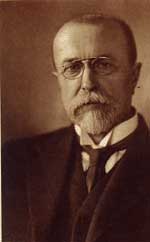Tomáš Garrigue Masaryk, Czech philosopher and sociologist, politician and statesman, first president of the Czechoslovak Republic (1918-1935). Among his main works are Sebevražda (Suicide), Česká otázka (The Czech Problem), Rusko a Evropa (Russia and Europe), Světová Revoluce (World Revolution), and Otázka sociální (The Social Question). After the first world war broke out, he left and remained abroad, where he worked tirelessly for the restoration of Czech independence. He was elected president of Czechoslovakia four times.

Suicide and the Meaning of Civilization, Thomas G. Masaryk. 1881. Masaryk explains, "no one has yet undertaken a definitive explanation of suicide from the sociological point of view. It is precisely this kind of explanation that most concerns us here, for the question of the causes of suicide involves the very happiness or unhappiness of mankind"
With its defeat in the First World War (1914-1918), Austro-Hungary collapsed. New states emerged from its ruins, among them Czechoslovakia, which was founded on October 28, 1918, as a democratic state with Tomáš G. Masaryk (1850-1937) as its president. In addition to Bohemia and Moravia, Czechoslovakia also included Slovakia and Podkarpatská Rus (Subcarpathian Ukraine). Given its ethnic composition and its population of 14 million, it was not a very stable state. Along with two and a half million Slovaks, who since the fall of the Great Moravian Empire had been part of Hungary, Czechoslovakia comprised a German minority of nearly three million, a more than half-million Hungarian minority in Southern Slovakia, a Polish minority in Northeast Moravia, and a Rusyn population in Podkarpatská Rus

|


